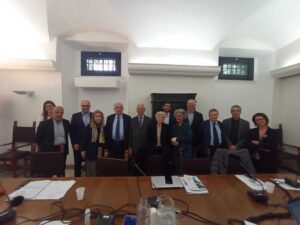CULTURAL HERITAGE – The FBCEI Council ends its mandate
 In the coming months, the Italian Touring Club, in collaboration with the Foundation for Jewish Cultural Heritage in Italy – FBCEI, will publish a guide to some of the most relevant Jewish sites in the country. It should be released before next summer “and will reach a wide audience in September, on the occasion of the European Day of Jewish Culture”, announced FBCEI’s outgoing president Dario Disegni.
In the coming months, the Italian Touring Club, in collaboration with the Foundation for Jewish Cultural Heritage in Italy – FBCEI, will publish a guide to some of the most relevant Jewish sites in the country. It should be released before next summer “and will reach a wide audience in September, on the occasion of the European Day of Jewish Culture”, announced FBCEI’s outgoing president Dario Disegni.
Disegni chaired the end-of-term meeting of the Foundation’s board, in office since the beginning of 2020. It will be up to the Union of the Italian Jewish Communities to evaluate the nominations for the new board received under a call launched in February and to announce its choices for the next four years term.
During the meeting, Disegni drew a “very positive” assessment of what has been done in 2023 and, more generally, over the last four years, “with the advancement of the numerous projects launched nationwide and the increased visibility of the Foundation, which collaborated on important exhibitions and publications.”
In other words, there is “a lot on the plate” in the future of the FBCEI, confirmed Disegni to Pagine Ebraiche. It will be crucial to carry it out in the best possible way because “the conservation and the enhancement of the Jewish cultural heritage is a key objective for the Italian Judaism and society as a whole, especially during these difficult and worrying times.” Knowledge generates awareness, pointed out Disegni, who is also the president of the National Museum of Italian Judaism and the Shoah – MEIS in Ferrara and of the Jewish Community of Turin. And awareness “counteracts prejudice.”
Such is the case with the ongoing project for the renovation and the enhancement of the ancient Jewish cemetery of the city of Gorizia, a monument that will be in the spotlight when Gorizia and its Slovenian “twin city” Nova Gorica will be the 2025 European Capitals of Culture. Such a circumstance, explains Disegni, “will draw the attention of a wide audience from all over Europe and the world and will foster the development of Jewish cultural tourism projects in those territories as well.”
FBCEI, furthermore, will continue the “survey on the liturgical music sources” of Italian Judaism “based on a first survey that has already been launched” that has resulted in an excel file with around 800 entries “and on additional research conducted by a working group from the Council together with the musicologist Massimo Acanfora Torrefranca.”
Translated by Marta Gustinucci and revised by Francesca Roversi, students at the Secondary School of Modern Languages for Interpreters and Translators of the University of Trieste, trainees at the newspaper office of the Union of the Italian Jewish Communities – Pagine Ebraiche.
